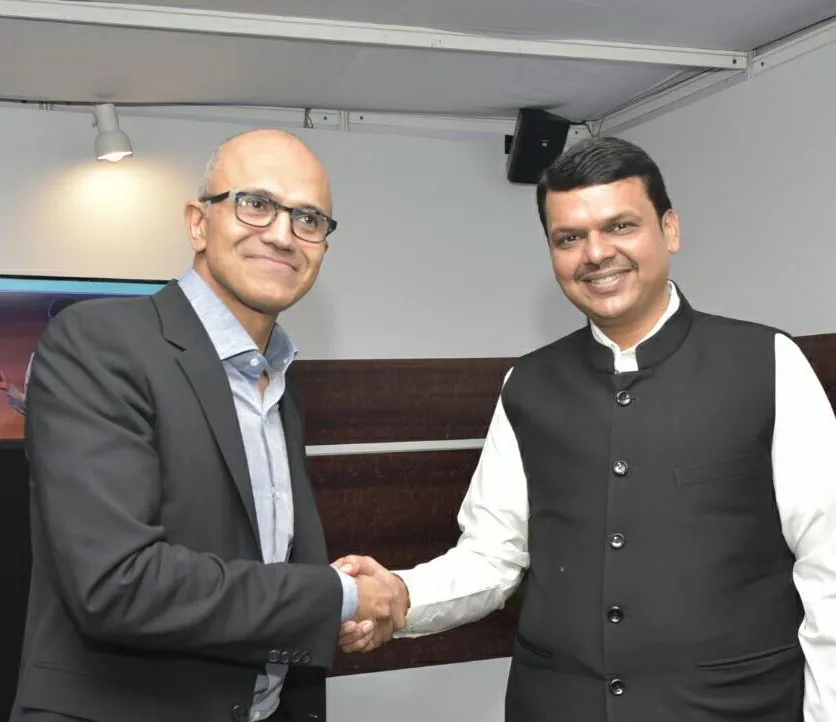At first sight, the results from the local polls in Maharashtra - not just to the Brihanmumbai Municipal Corporation, but those for 9 other local governments - seems to be more of the same. The Bharatiya Janata Party has done well, if not as sweepingly as in 2014, and the Congress has continued its apparently inexorable downward slide into the history.
But there's a deeper significance here that's worth teasing out. And that is that these two things have indeed happened at the expense of each other. Essentially, the BJP is the new Congress. And, in many words, terrible as this is for the Congress, it's not great news for the BJP either.
The BJP is the new Congress because its ideology - muscular, centralised Hindutva hypernationalism - has largely replaced the Congress' mushy centrism as the dominant centralising pole of Indian politics. It is the BJP and not the Congress that is now, to adopt Rahul Gandhi's phrase, the "default operating system" of Indian politics. In the BMC election, the party's excellent showing has come largely at the expense of the Gandhi Congress, which has dipped from being second with 50-plus seats in the last corporation to being a very distant third. For those uncomfortable with the regionalism and patronage mechanisms of the Shiv Sena, it is the BJP that is now the obvious choice and not the Congress. It is the BJP that is now the party of the high command, of national unity, of "Indian" rather than local affiliation. I could well argue over whether the BJP's ruling ideology is in fact "Indian" or "national" - but, from the point of elections, it doesn't matter if who wins that argument, only that enough voters see it as the dominant strain of national ideology today.
Elsewhere too, the BJP is replacing the Congress as the "national" pole of regional politics. In Odisha, some believe that it is now the main challenger to the Biju Janata Dal. In Bihar, the Gandhi Congress is in alliance with regional parties, and the BJP is alone in opposition - after it fought an election without a state-level figurehead. In Telangana, the BJP genuinely believes that it, and not the Congress, will provide the "national" element in local politics over the coming decades. And so on.
There is space only for one national party in India. It was long the Congress. Now it is the BJP. The BJP had long been an agglomeration of regional parties in some ways, with different priorities in different states and strong satraps. That is slowly dying out, as an Indira-like high command exerts its will over the party organisation - a will rendered unchallengeable by the PM's Indira-like connection with voters.
So how on earth could this be any other than brilliant news for the BJP? Well the answer lies visible before you in these Maharashtra elections: it has done very well, but not enough to win. The truth is that the "Congress-mukt Bharat" the party's leadership endlessly promises would be the BJP's worst nightmare. For the Congress, the "national" vote plus its old minority-Dalit-Brahmin coalition used to be enough to win. But for the BJP, the "national" vote plus its own core Hindutva vote might not be enough to win. We've seen this demonstrated again and again in elections when the declining Gandhi Congress isn't the BJP's main opponent.
And what is that main opponent of the BJP, if not the Gandhi Congress? Well, it's what the main opponent of the Congress was before the rise of the BJP: sub-national political forces, ranging from the benign to the somewhat xenophobic. This centralising vs regional pole is the essential division of Indian politics. Even new parties, such as AAP, know they have to be a coalition of regional forces first even if they have national ambitions - see what it's up to in Punjab, where it is running a clearly sub-nationalist campaign. Remember also that in most places where the BJP rose against the Congress, in the north and the west and Karnataka, it did so primarily as a state-centric party driven strongly by local caste coalitions. Now the position is reversed: the BJP is the homogenising centralising force, and its primary opponent will be the local, deeply rooted party - such as the Shiv Sena in Mumbai, the undisputed winner of this set of elections.
The breakdown in relations between the Shiv Sena and the BJP is not a transitory phenomenon. Even if the two parties come together again sometime in the future, the Shiv Sena can hardly settle for being a junior partner locally. That is too much of a blow to local pride. No regional party suffers being a junior partner to a national one in its own state if it wants to survive. (The NCP did for years, and it isn't surviving.) And if the BJP now represents the "national", then the Shiv Sena, as the local Maharashtra representative of sub-nationalism - of the most extreme kind - can hardly do anything but, eventually, come to oppose the BJP. Such are the natural poles of Indian politics.
So, the BJP can look at a rosy future in which it is the new Congress. But it must also reckon with the fact that it will inherit the Congress' curse: anti-Congressism will become anti-BJPism. Disdain for centralisation, the power of the PM's outsize personality, and fear of homogeneity and high commands will force regional political parties together just as opposition to the Gandhi Congress did in the past. And this will be worse for tomorrow's BJP than yesterday's Congress, because its base is just not large enough to triumph consistently if BJPism vs anti-BJPism becomes the new norm.
If the BJP is sensible, it will realise that becoming the new Congress means it will actually have to become more like the old Congress: expand its sociological and ideological footprint, recognise that sometimes a certain muddiness of ideology can allow disparate forces to live together under the same umbrella. If that happens, maybe we'll return to a stable equilibrium of BJP and non-BJP governments, with the Gandhi Congress reduced to a bit player, strong in some states, occasionally supporting other regional forces. If the BJP is unable to expand its social coalition - well, it had better enjoy its success, because the chances are it won't last for as long as it would like.
This commentary was published in ndtv.com
The views expressed above belong to the author(s). ORF research and analyses now available on Telegram! Click here to access our curated content — blogs, longforms and interviews.




 PREV
PREV


